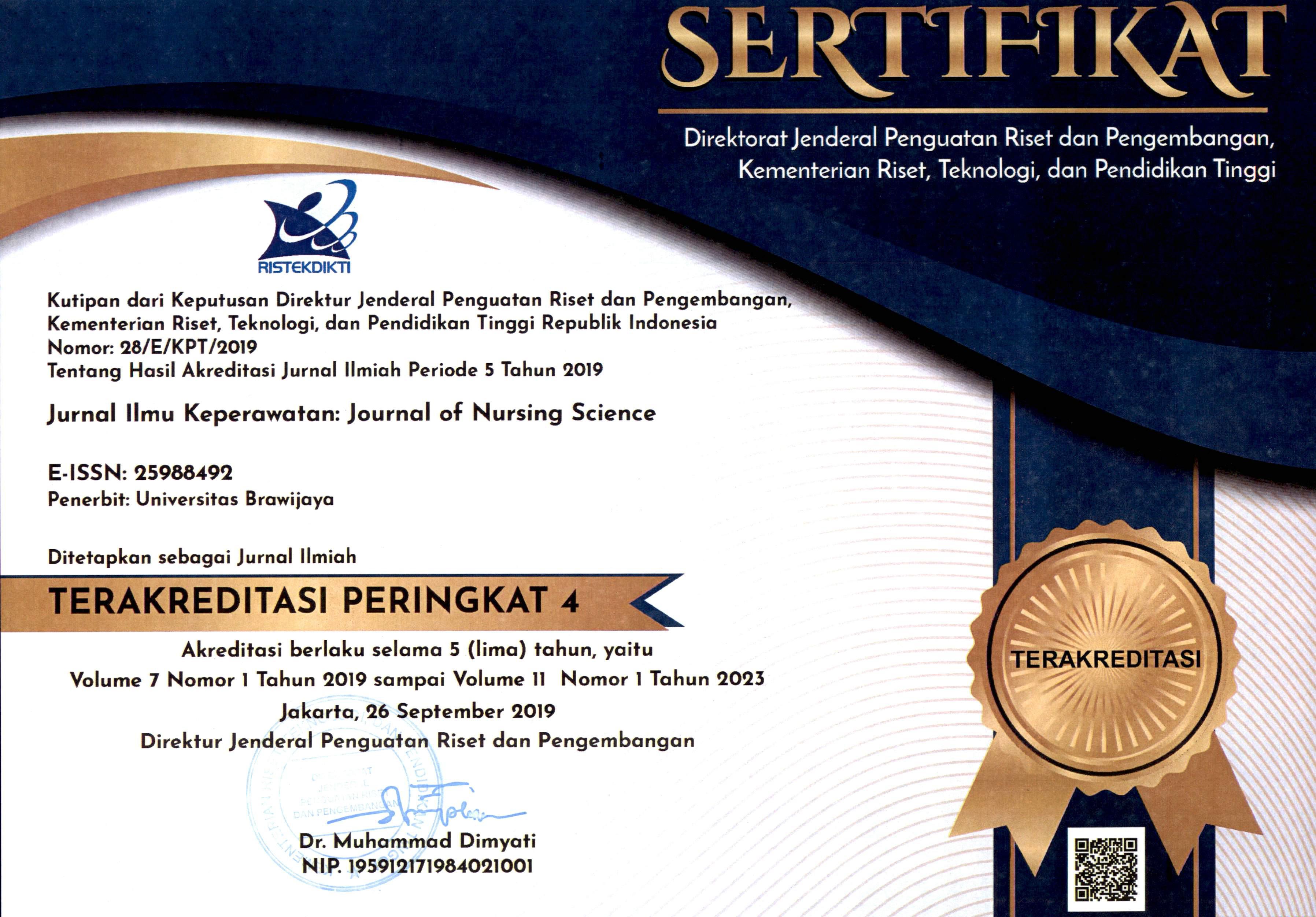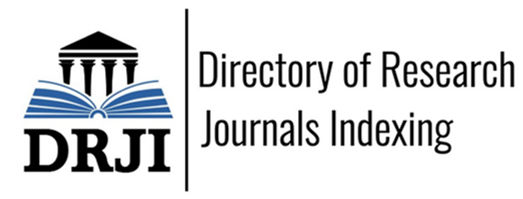FACTORS THAT INFLUENCE THE COMPLIANCE OF ANTIRETROVIRAL THERAPY (ART) ON HIV / AIDS PATIENTS IN DR. SARDJITO YOGYAKARTA
DOI:
https://doi.org/10.21776/ub.jik.2019.007.01.3Keywords:
Adherence, Antiretroviral Therapy, HIV/AIDSAbstract
Antiretroviral therapy (HAART) is very important for patients with HIV/AIDS in order to prevent the appearance of AIDS symptoms, reduce hospitalizations and prevent mortality. But it required minimum of 95% adherence rate to prevent the occurrence of viral resistance to and AIDS development. Identification of the factors that influence adherence are needed to develop appropriate interventions to maintain patient adherence. The aimed of the study was to assess adherence rate with antiretroviral therapy in HIV-infected patients in Dr.Sardjito General Hospital and identify factors that influence it. Observational analytic study with cross sectional design was used in this study. The independent variable in this study is sociodemographic factors, social support, depression, self efficacy, quality of health care provider’s communication and patient's CD4 count. Bivariate and logistic regression is used to determine the factors that affecting adherence. A total of 64 HIV/AIDS patients participated in this study. 36 patients (56.3%) had adherence <95% with an average adherence of 83.64% (SD = 21.25). Depression, social support, self efficacy, quality of health care provider’s communication, age and employment status is associated with adherence (p <0.05). In multivariate analysis, low self-efficacy (PR = 12,94; p = 0,001) and low social support (PR = 5,47; p = 0,024) is a predictor of poor medication adherence. In conclusion self efficacy and social support is a predictor of adherence in HIV/AIDS patient. Interventions that focus on these factors is expected to improve patient adherence to medication.
References
- Barclay, TR., Hinkin, CH., Castellon, SA., Mason, IK., Reinhard, MJ., Marion, SD., et.al. (2007). Age-Associated Predictors of Medication Adherence in HIVPositive Adults: Health Beliefs, Self-Efficacy, and Neurocognitive Status. Health Psychol., 26(1) : 40–49
- Broder, S. (2010). The development of antiretroviral therapy and its impact on the HIV-1/AIDS pandemic. Journal of Antiviral Research., 85 : 1–18
- Catz, SL., McClure, JB., Jones, GN., Brantley, PJ. (1999). Predictors of outpatient medical appointment attendance among persons with HIV. AIDS Care, 11 : 361-373
- Cha, ES., Erlen, JA., Kim, KH., Sereika, SM., Caruthers, D. (2008). Mediating roles of medication–taking self-efficacy and depressive symptoms on self-reported medication adherence in persons with HIV: A questionnaire survey. International Journal of Nursing Studies., 45 : 1175–1184
- Colbert, AM. (2007). Functional Health Literacy, Medication-Taking Self efficacy and HIV Medication Adherence. Dissertation School of Nursing University of Pittsburg.
- Crowe, ML. (2009). Social Support in Later Life : The Influence of Retirement and Marital Status. Massey University, New Zealand
- Garcia, PR., Cote, JK. (2003). Factors Affecting Adherence to Antiretroviral Therapy in People Living With HIV/AIDS. Journal of the Association of Nurses In AIDS Care., 14(4) : 37-45
- Gremigni, P., Sommaruga, M., Peltenburg, M. (2008). Validation of the Health Care Communication Questionnaire (HCCQ) to measure outpatients’ experience of communication with hospital staff. Patient Education and Counseling., 71 : 57–64
- Hayness, RB., Ackloo, E., Sahota, N., McDonald, HP., Yao, X. (2008). Interventions for Enhancing Medication Adherence. The Cochrane Collaboration. Published by JohnWiley & Sons, Ltd
- Holstad, MKM., Foster, V; Dilorio, C., McCarty, F., Teplinskiy, I. (2010). An Examination of the Psychometric Properties of the Antiretroviral General Adherence Scale (AGAS) in Two Samples of HIV-Infected Individuals. Journal of the Association of Nurses In AIDS Care., 21(2) : 162-172
- Holstad, MKM., Pace, JC., De, AK., Ura, DR. (2006), Factors Associated With Adherence to Antiretroviral Therapy. Journal of the Association of Nurses In AIDS Care., 17(2) : 4-15
- Johnson, MO., Neilands, TB., Dilworth, SE., Morin, SS., Remien, RH., Chesney, MA. (2007). The Role of Self-Efï¬cacy in HIV Treatment Adherence: Validation of the HIV Treatment Adherence Self-Efï¬cacy Scale (HIV-ASES). Journal of Behavioral Medicine., 30 : 359–370
- Lazcano-Ponce, E., Angeles-Llerenas, A., Alvarez-del Rio, A., Salazar-Martinez, E., Betania, A., Hernandez-Avila, M.,
- Kraus-Arnold. (2004). Ethics and communication between p
- hysicians and their patients with cancer, HIV/AIDS, and rheumatoid arthritis in Mexico. Archives of Medical Research., 35(1) : 66–75
- Luszczynska, A., Sarkar, Y., Knoll, N. (2007). Perceived social support, self-efficacy, and finding benefits in disease as predictors of physical functioning and adherence to antiretroviral therapy. Journal of Patient and Education Counseling, 66 : 37–42
- McDowell, I. (2006). Measures Health : A Guide to Rating Scales and Questionnaires. Oxford University Press.
- Montaner, JSG., Montessori, V., Harrigan, R.,
- O’Shaughnessy, M., Hogg, R. (1999). Antiretroviral Therapy : “The State Of The Artâ€. Journal of Biomedicine & Pharmacotherapy ., 53 : 63-72
- Penzak, SR., Reddy, YS., Grimsley, SR. (2000). Depression in patients with HIV infection. Am J Health-Syst Pharm., 57
- Ramadian, O., Riztriawan, E. (2010). Pengaruh Efek Samping Antiretroviral Lini Pertama Terhadap Adherens pada ODHA di Layanan Terpadu HIV RSCM. Kelompok
- Studi Khusus HIV/AIDS RSCM Jakarta. Diakses pada tanggal 6 Juli 2011 dari www.aidsindonesia.or.id/download/ARV-RSCM.pdf
- Rintamaki, LS., Davis, TC., Skripkauskas, SB., Charles; Wolf, MS. (2006). Social Stigma Concern and HIV Medication adherence. Journal of AIDS Patient Care and STDs., 20(5)
- Roura, M., Busza, J., Wringe, A., Mbata, D., Urassa, M., Zaba, B. (2009). Barriers to sustaining antiretroviral treatment in Kisesa, Tanzania: a follow-up study to understand attrition from the antiretroviral program. AIDS Patient Care and STDs., 23 : 203–210
- Russell, J., Krantz, S., Neville, S. (2004), The Patient-Provider Relationship and Adherence to Highly Active Antiretroviral Therapy. Journal of the Association of Nurses In AIDS Care., 15(5) : 40-47
- Spire, B., Duran, S., Souville, M., Leport, C., Raffi, F., Moatti, JP., et.al. (2002). Adherence to highly active antiretroviral therapies(HAART) in HIV-infected patients: from a predictive to a dynamic approach. Social Science & Medicine., 54 : 1481–1496
- Stirratt, MJ., Remien, RH., Smith, A., Copeland, OQ., Dolezal, C., Krieger, D. (2006). The role of HIV serostatus disclosure in antiretroviral medication adherence. Aids and Behavior., 10(5) : 483-493
- Valente, SM. (2003). Depression and HIV Disease. Journal of the Association of Nurses In AIDS Care., 14(2)
- Vyavaharkar, M., Moneyham, L., Corwin, S., Saunders, R.,
- Annang, L; Tavakoli, A. (2010). Relationships Between Stigma, Social Support, and Depression in HIV-Infected African American Women Living in the Rural Southeastern United States. Journal of the Association of Nurses In AIDS Care., 21(2) : 144-152
- Wexler, B. (2008). The Information Series on Current Topics HIV/AIDS. Texas : Cengale Learning
- Williams, A. (1997). Antiretroviral Therapy : Factors Associated With Adherence. Journal of the Association of Nurses In AIDS Care., 8 : 18-23
Downloads
Published
How to Cite
License
Authors published in this journal agree to the following terms:
1. The copyright of the received article shall be assigned to the journal as the publisher of the journal. The intended copyright includes the right to publish the article in various forms (including reprints). The journal maintains the publishing rights to the published articles.
2. Authors may enter into separate additional contractual agreements for the non-exclusive distribution of the published journal version of the work (for example, posting it to an institutional repository or publishing it in a book), with acknowledgment of their initial publication in this journal.
3. Authors are permitted and encouraged to post their work online (e.g. in an Institutional Repository or on their website) before and during the submission process, as this can result in a productive exchange, as well as earlier and larger citations of the published work.
4. Articles and all related material published are distributed under Creative Commons Attribution-NonCommercial 4.0 International License or CC BY-NC 4.0 license.
JNSU is licensed under a Creative Commons Attribution-NonCommercial 4.0 International License or CC BY-NC 4.0 license.





























